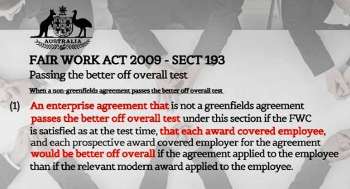|
Coles Worker could Bring Down Enterprise Bargaining [EBA] System if Wage Challenge is Successful
by staff report ABC via shirl - ABC (Oz) Tuesday, Apr 4 2017, 4:37am
international /
prose /
post
Business figures and industrial relations experts are warning of workplace chaos caused by the possible collapse of enterprise bargaining agreements (EBAs) covering hundreds of thousands of workers.

The future of many existing EBAs has been put in doubt by the Fair Work Commission's new interpretation of the "Better Off Overall Test" (BOOT) which was introduced in 2009 after Labor abolished the Howard government's WorkChoices regime.
Business Council of Australia chief executive Jennifer Westacott, former ACTU national secretary Greg Combet and one-time Coalition IR minister Eric Abetz have all called for the protection of enterprise bargaining.
Brisbane mother of two Penny Vickers, who stacks shelves at Coles at night, is challenging the company's 2011 EBA with her union, the Shop Distributive & Allied Employees Association (SDA).
Ms Vickers, who is representing herself at the Commission, claims she is $33-a-week worse off under the Coles EBA than she would otherwise be under the award.
Coles' 74,000 workers are employed under a 2011 EBA because the Commission last year struck down the 2014 EBA following a successful challenge by trolley collector Duncan Hart.
'It's got to be fixed'
SDA national secretary Gerard Dwyer said the "rolling up" of penalty rates at Coles and Woolworths, as part of the union-negotiated EBAs, had delivered weekly wage rates $90 higher than the award rate.
"Reporting on the wage outcomes reached for Coles workers always fails to take into account higher rates paid to the workforce in non-penalty hours," he said.
But Ms Vickers said there were many Coles workers who, like her, worked unconventional hours.
"We find ourselves in this situation where day staff are paid substantially above the award, if they only work 8.30am to 5pm, and night staff are paid substantially below the award," she said.
"Now, in retail when do shoppers want to shop? Nights and weekends, when they're not working, and so there's a lot of people being paid less than the award.
"You can't tell people that it's all OK if they're being paid less than the award. It's got to be fixed."
'A single employee's complaint might sink agreement'
Under section 193 of the Fair Work Commission, EBAs pass the Better Off Overall Test if the Commission is satisfied that "each award covered employee, and each prospective award covered employee" would be better off overall.
Before last year's Coles decision, the test was applied by looking at employees under the award as a whole, rather than every individual.
If Ms Vickers topples the 2011 Coles EBA in line with the interpretation of the better off overall test in the Duncan Hart case, other EBAs affecting low-paid workers could be challenged.
But Mr Dwyer said the SDA was already "working to renegotiate a new BOOT-compliant EBA" that delivered strong wages and conditions for its members in light of the decision in the Hart case.
The Productivity Commission had warned of the alternative interpretation of the Better Off Overall Test six months before the Fair Work Commission's decision on the Coles EBA in June last year.
"In practice, the FWC has typically used the BOOT in relation to a given class of employees, but there remains a risk that a single employee's complaint might sink an agreement," the Productivity Commission said in report on Australia's workplace relations framework published in December 2015.
"Statutory change to ensure that the test be for a class of employees would address this problem."
Sydney barrister Jeffrey Phillips, an industrial relations specialist, said the wording of the Better Off Overall Test in Section 193 was problematic.
"The provision of the statute's fairly clear. I think the words are intractable, I can't see how one can get around them other than by an amendment to the Act," Mr Phillips said.
"Now if enterprise agreements can be upset because one or two people are able to say, 'Well look at my situation, my situation is such that I'm not any better off, in fact I'm worse off,' that would have the effect of bringing the whole house down."
Ms Westacott echoed this concern.
"If the interpretation is going to be that every single person has to be better off on every single agreement, we will see, I think, potentially a risk in the whole enterprise bargaining process," she said.
"And let's be very clear that people under enterprise agreements get paid more than people on awards."
Mr Combet would not be drawn on whether the BOOT had to be redrafted but said enterprise bargaining needed to be preserved.
"Continuing a system of enterprise bargaining in our economy is extremely important because it allows companies to adjust to competitive circumstances and it also allows employees and their unions to negotiate with their employers improved pay and employment conditions in return for productivity gains," he said.
"[It's] a very important system that has helped Australia achieve 25 years of uninterrupted economic growth, an extraordinary achievement given all of the global economic challenges there have been.
"So ensuring that we've got a strong, robust system of enterprise bargaining, that both protects employees, allows them to gain wage increases in return for productivity improvements, and for companies to continually improve their competitiveness, that's a very important part of our industrial relations system."
'We can't just have this system fall away'
Ms Westacott said no-one wanted enterprise bargaining to collapse and called for bipartisanship from Labor and the Coalition.
"That requires the interpretation of the BOOT test in the spirit of better off overall," she said.
"If more than 90 per cent of people agree to something, then surely that is actually an agreement that holds in the Fair Work Commission's eyes. Now, we just can't have this system fall away."
Former Coalition IR minister Eric Abetz said the pressure would be on Labor leader Bill Shorten to help the Turnbull Government amend BOOT, if EBAs started falling over in the wake of the Hart and Vickers cases.
"During the GFC, it has been asserted by a number of people, that the enterprise bargaining arrangements allowed employers the flexibility to not have to sack their workers but to give them less hours but still keep them on the books, and as a result, keep people in employment and the businesses afloat," Senator Abetz said.
"I think the enterprise bargaining system should be supported, it is one of those good things that came from the Hawke-Keating-Kelty era and I trust that Bill Shorten is willing to recognise that and assist the Government in the event that legislation is required."
Copyright applies.

http://tinyurl.com/k59vovn
<< back to stories
|